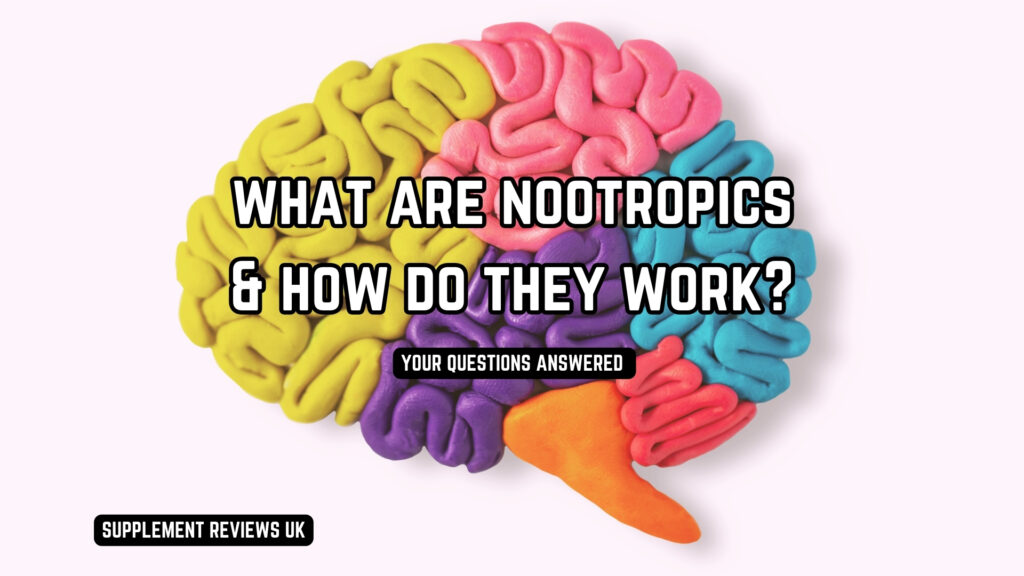 The desire to unlock the full potential of the human mind has long spurred interest in nootropic substances or Smart Drugs, ever since the term was first coined in the 1970s. But what are nootropics and how do they work?
The desire to unlock the full potential of the human mind has long spurred interest in nootropic substances or Smart Drugs, ever since the term was first coined in the 1970s. But what are nootropics and how do they work?
What substances qualify as nootropics and are nootropics safe?
Allow us to answer all your questions about nootropics or smart drugs. But first…
How Do You Pronounce ‘Nootropics?’
Hint: it’s not pronounced ‘new!’
Before we start talking about nootropics in detail, it might help to know how to pronounce the word Nootropic. That double o causes a lot of confusion.
You’ll hear some people referring to it as ‘new-troh-pik’ but really it should be:
UK Pronunciation: ‘Noh-uh-trop-ik’
US Pronunciation: ‘Noh-uh-troh-pik’
To make it easier, you can hear the different pronunciations here:
https://dictionary.cambridge.org/pronunciation/english/nootropic
Frequently Asked Questions
What Are Nootropics?
So, let’s start with the basics: what are nootropics? The premise behind nootropics is simple, albeit powerful and emotive – nootropics, natural or synthetic, act as cognitive enhancers, boosting the brain’s performance and natural abilities. Hence their other name – Smart Drugs.
Nootropics help to enhance certain aspects of cognition by providing the brain with the fuel it needs.
Like putting premium fuel in your car.
Like giving a thirsty man water
Or a hungry man food.
You get the drift.
They are substances that help your brain to perform at its optimal best. Which is why prescription meds such as Adderall for ADHD and Modafinil for narcolepsy are also classed as nootropics.
Some nootropics even help to maintain overall brain health, while others are being investigated for their potential role in tackling diseases such as Alzheimer’s and Parkinson’s.
<<< Discover the Best Nootropics in the UK <<<
What Can Nootropics Do?
Nootropics claim to help:
Focus – Memory – Mood – Motivation – Focus – Concentration – Multi-tasking – Learning – Recall – Alertness – Energy – Wakefulness – Attention – Stress – Long-term Brain Health
There’s one slight catch, however: no one nootropic can do all of the above. Even the best nootropics tend to focus on just one or two areas.
Some nootropics affect memory, others help you deal with stress and mood. Different nootropics are best for motivation, or learning or attention and more. Which is why combining nootropics into nootropic stacks can be very effective (more on that later).
What Substances Count As Nootropics?
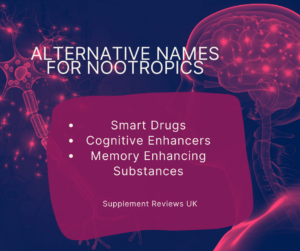 The first thing we should mention is that nootropics aren’t necessarily drugs. They can be, we’ll come onto that in a moment, but they can also be naturally-occurring.
The first thing we should mention is that nootropics aren’t necessarily drugs. They can be, we’ll come onto that in a moment, but they can also be naturally-occurring.
Think vitamins, minerals and herbs such as Gingko Biloba, fish oil, and Lion’s Mane.
Each ingredient may play one specific role in influencing certain bio-activity, such as memory.
Some may improve memory recall, while others boost memory formation. Other nootropics may do both and more, or something entirely different.
Some Examples of Nootropics
BACOPA MONNIERI
The flower Bacopa Monnieri, long used in Ayurvedic medicine, is known for its ability to improve memory retention, restoration and formation, particularly influential on working and spatial memory.
It also acts as an antioxidant to protect the brain from free radicals.
L-THEANINE
In contrast, L-Theanine, an amino acid found in green tea, is best used to reduce stress and anxiety in order to improve focus and alertness.
CHOLINE
Citicoline, a source of choline, a natural nutritional supplement that is also found in the body, is needed for grey matter to form in the brain.
Boosting it helps to enhance the brain, bringing with it the ability to mentally process things faster, think quicker and concentrate better, as well as boosting memory.
Science is still identifying more natural nootropics and assessing their potential as cognitive enhancers.
SEE OUR MASTER LIST OF NATURAL NOOTROPIC INGREDIENTS
As well as natural nootropics, there are also synthetic ones.
PIRACETAM
The very first nootropic, Piracetam, was made in a lab and was a breakthrough in our understanding of cognitive enhancers (and inspired the very definition of nootropics).
It has encouraged numerous derivatives, all of which share a similar chemical makeup to Piracetam and work in the body in a very similar way (read on for an explanation), hence the term racetams.
What Are Racetams?
While we’re talking about what are nootropics, we need to talk about racetams. Racetams are cognitive enhancing synthetic drugs grouped together because of their similar chemical structure.
If you really want to know the science, they have a two-pyrrolidone nucleus comprised of oxygen, nitrogen and hydrogen, and their similar structure means that they operate in effectively the same way.
They do vary in potency, dosage and strength, however, with Pramiracetam being up to 30 times stronger than Piracetam, as an example.
The racetams share a significant purpose with the natural herbs, vitamins and minerals mentioned above.
They won’t make you smarter per se, but they will help you to use your God-given cognitive talents to a fuller potential. And maybe prevent them from deteriorating with age.
Of course, some people would argue that stimulants also help you to focus and concentrate, and who hasn’t used a cup or two of coffee when they need a pick-me-up?
Are Nootropics the Same as Stimulants?
According to C.E. Giurgea, the researcher who discovered nootropics in 1972, genuine nootropics should have very few, if any, side-effects and shouldn’t be toxic. This is a key point that shouldn’t be glossed over.
Many stimulants, drugs and man-made substances claim to improve the memory or prevent its decline, likewise to boost overall brain power, but these come with a negative – they have potentially significant side-effects.
Nootropics are not stimulants, and shouldn’t bring the risks associated with them such as insomnia, anxiety and the jitters.
This fits with the rest of the definition which states that nootropics should promote brain health and resist injury or diseases which threaten it.
Who Uses Smart Drugs?
Anyone over 18 can use nootropics. They’re popular with students, entrepreneurs, working mothers, powerful CEOs, and older people alike, along with many others. Anyone who needs to hone focus, improve memory, de-stress, boost energy and more.
Can You Combine Nootropics?
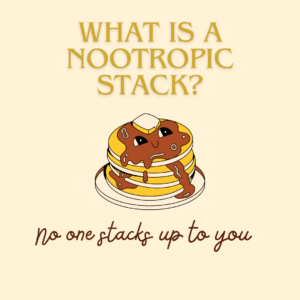 Yes, you can combine nootropics in a ‘stack’. In fact, if you want a supplement that does more than one thing, maybe even more than two or three things mentioned above, you will probably need to opt for a nootropic ‘stack’.
Yes, you can combine nootropics in a ‘stack’. In fact, if you want a supplement that does more than one thing, maybe even more than two or three things mentioned above, you will probably need to opt for a nootropic ‘stack’.
What Is a Nootropic Stack?
A nootropic stack is a supplement or product which puts several nootropics together in order to tackle more than one area of cognitive ability. Their exact function will depend on the ingredients.
Nootropic stacks not only allow you to boost more than one area of cognitive function, but certain nootropics combine so well with others that they become stronger together. So nootropic stacks can be much more powerful than individual nootropics alone.
You can buy these stacks ready-made – we will review a fair few on this website – or make the stacks yourself.
The former is easier (all doses are already worked out for you), but the latter offers more flexibility. Read up a lot more on nootropics before you choose to do it yourself.
<<< Discover our Favourite Nootropic Stack <<<
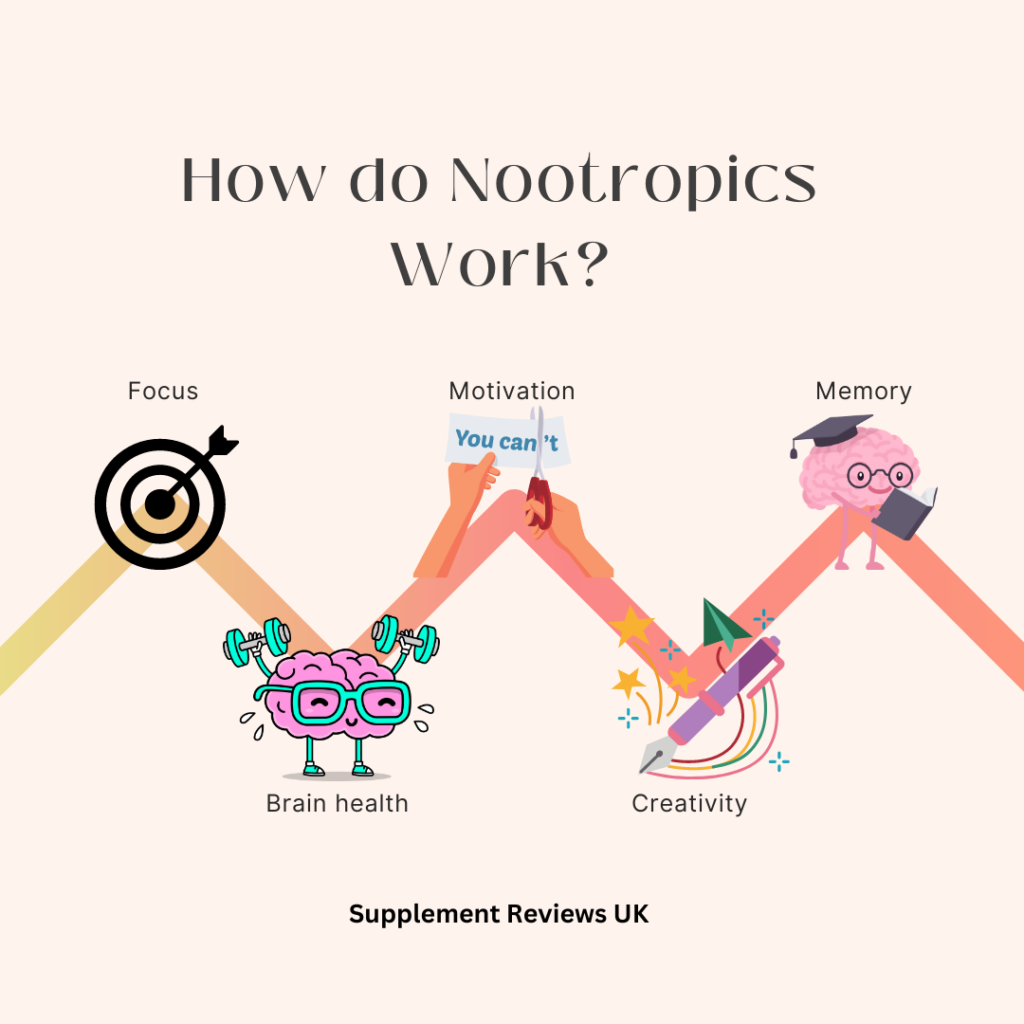
How Do Nootropics Work?
Right, now it’s time to get down to the science. How do nootropics actually work? How can you take a supplement and improve your attention span, or memory, or focus?
Nootropics operate in a couple of fundamental ways, but the majority of them work in a similar broad sweep manner by influencing the neurotransmitters in our brains.
Think of the brain as a pathway of neurons which all need to talk to one another to keep the brain functioning. Neurotransmitters, as the name suggests, ‘transmit’ signals between these neurons, improving communication.
The more neurotransmitters you have, the better the communication, which in turns leads to longer attention spans, improved memory, faster mental processing and more. It’s similar to increasing the RAM on your computer; everything just works more efficiently.
More than 100 neurotransmitters…
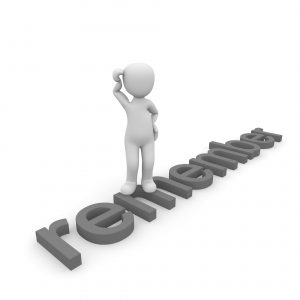 There are more than 100 neurotransmitters in the brain, each with their own particular role to play in the greater whole.
There are more than 100 neurotransmitters in the brain, each with their own particular role to play in the greater whole.
You’ve probably heard of some – dopamine, serotonin, epinephrine (adrenaline) and norepinephrine. There’s also another crucial one, acetylcholine.
Different nootropics work on one or more of these neurotransmitters, either encouraging the brain to produce more of the substance, or helping it to avoid deterioration.
Piracetam, for instance, influences acetylcholine, which aids plasticity of the synapses, helping them to link up better.
Brain functions such as memory are comprised of matrices of synapses and how well they link determines how effective the memory is.
In contrast, the plant Rhodiola rosea influences and boosts the level of serotonin and dopamine, as does vitamin B6.
Other nootropics also act as a raw material helping the brain to repair or maintain brain cells, and some, such as the naturally-occurring alkaloid Vinpocetine, act as vasodilators, increasing blood flow to the brain. This is significant because it reduces the stress on brain cells when they are oxygen deprived.
Do Nootropics Have Any Side Effects?
If we recall the definition of nootropics, it states that they should be low in side-effects and virtually non-toxic. That doesn’t mean they are 100% safe in all situations, however.
Most side effects of nootropics either occur because users don’t know enough about the topic to choose an effective stack (our reviews will help you decide), or take too much of a particular substance.
Certain synthetic nootropics such as those in the racetam family may also have some contraindications when mixed with alcohol or other medications. Piracetam, for instance, may heighten the effects of alcohol.
Are They Addictive?
It’s hard to give a definitive answer to the question of whether nootropics are addictive because there are dozens of nootropic supplements and substances on the market and the one-size-fits-all answer does not apply here.
Likewise, what seems benign to one person may affect someone else differently.
It is accurate to say, however, that as a general rule genuine nootropics carry very little risk of addiction. Some may even continue to boost overall brain function once you stop taking them.
It follows, therefore, that you shouldn’t experience withdrawal symptoms when you discontinue use, though you may suffer from a little ‘brain fog’ until your brain gets used to the new normal.
How Can I Choose the Best Nootropic for Me?
The upshot of all this information is that it is best to know your stuff before you start using nootropics, if only to ensure you opt for the best supplement or nootropic stack for you. Our independent reviews are here to help you do just that.
Happy reading.